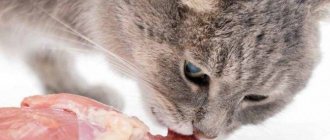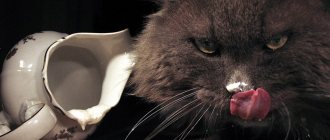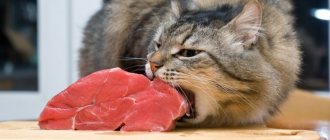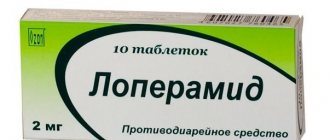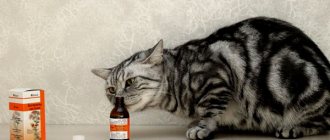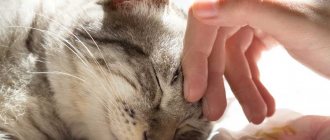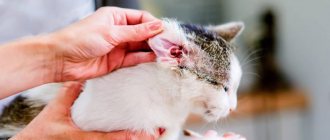General information about valerian officinalis
Valerian has been known for a long time, since ancient times.
It is believed that the most medicinal parts of this plant are the roots, which have always been used in ancient Greece, Egypt, Rome, the East, and India. But besides the scientific name - valerian officinalis, this plant also has several names that it received among the people - cat grass , cat root, maun - grass. This is due to the fact that the smell of this plant has a special effect on cats.
Valerian is a plant that belongs to the family of perennial herbs . This grass grows near water bodies, as well as in wetlands and lowlands. The plant consists of the following parts:
- A thick and tall stem that can reach a height of up to two meters.
- Pinkish flowers collected in an umbrella.
- A small, short and loose root that has many branches.
As soon as cats hear the smell of this plant, they will immediately gather near this place. It has been proven that cats can hear this smell at a very long distance. The reaction of cats to this medicinal plant is unusual: they roll around, trying to damage the plants, then lick the juice .
This leads to the fact that they begin to roll and roll on the ground, they can still jump, but, most importantly, they meow very much . The stimulating effect of valerian only affects cats; for humans, this medicinal plant is used as a sedative.
Opposite effect
Cats do not always become playful under the influence of valerian. For some, its aroma has the opposite effect. Pets can, after sniffing even a little of the extract of this plant, become aggressive, irritated, and even rush at their owner and bite him. And, despite the fact that your pet may already be of advanced age, under the influence of valerian he will begin, just like a young animal, to run and jump without stopping. But you should not forget that an elderly cat may develop heart problems after such a playful mood after taking the drug.
Cats' reaction to valerian
The stimulating effect of valerian on a cat has long been noticed by people. As soon as you bring the lid of the jar containing the medicine to the animal’s nose, he will instantly grab onto it and lick it , without letting anyone in or giving it away.
And only after that he will begin to behave strangely. The effect of the medicine will wear off in 10–15 minutes. After this, the cat will go about its business as if nothing had happened.
Why do cats react this way to valerian? There are several reasons:
- Cats are addicted to certain plants. This list also includes valerian.
- Valerian in its smell reminds cats of the smell of cat hormones. This explains that the medicinal plant only affects cats.
Based on this, valerian should not be given to cats , since it serves as a kind of drug for animals. And in the future, such use will also lead to the fact that the animal becomes lethargic, constantly feels unwell, and various diseases appear. There are cases where even the death of an animal occurred.
Is it possible to give a cat valerian, which comes in tablets?
It is known that valerian tablets are a stronger and more dangerous remedy compared to drops. This is due to the fact that the composition of the drug in tablets is changed compared to the composition found in drops.
So, the tablets contain a quarter of valerian, and the rest are synthetic excipients that can cause allergies.
If, nevertheless, you had to give the cat several tablets, and now he sleeps all the time, then you need to immediately consult a doctor or even take him to the clinic as soon as possible.
How to relieve a cat's heat
Few people, when purchasing a cat, think about the upcoming problems and the occurrence of unpleasant, uncomfortable situations. However, when a cat is in heat, many people want to know how to calm the animal, because it happens that the cat meows very loudly for a long time and even tries to mark the territory.
There are times when it is almost impossible to calm down a pet because the cat does not want to play and does not respond to relaxing procedures. In such a case, it is worth using specialized drugs that will help improve the animal’s well-being, and therefore change its behavior.
Is valerian harmful for cats?
Valerian for cats is a kind of drug , and drugs are never useful.
Veterinarians believe that you should not joke with cats’ health and give them this drug for fun. There is another way out: you can buy a special soft toy intended for cats, which is already saturated with a substance called “ catnip ”. This herb can be found everywhere, its effect does not affect the cat’s body, and many cats are simply indifferent to it.
For example, it is believed that kittens do not react in any way to the action of this drug until they are six months old. In addition, there are several breeds of cats, for example, Siamese, which are also immune to valerian.
If the cat at this moment is also ready to mate, then you should not give her valerian , because she is already in an excited state, and the remedy from the medicinal plant will only strengthen this desire.
And then it is still unknown how this adventure will end for the cat. At such times, it is better to give “cat Bayun”, which will have a calming effect. But in the event that you do not expect purebred offspring from her.
But sometimes valerian is given to a cat for medicinal purposes . It is known that in small doses it will be useful in the treatment of the gastrointestinal tract, as well as in the treatment of nervous diseases. Veterinarians claim that valerian drops are beneficial for the cat’s thyroid gland and normalize its functioning, but such treatment can only occur if prescribed by a doctor.
You shouldn’t get carried away with giving your cat valerian to drink, otherwise the consequences could be dire. By the way, an overdose can also negatively affect the health of the cat.
Overdose symptoms
There are cases when a cat was able to get to valerian on its own, and even managed to eat a package of pills or open a bottle of medicinal tincture.
As a result, an overdose of the drug , and immediate intervention by a veterinarian was required, because the animal’s life was in danger.
Signs of overdose are the following:
- the cat falls on its side;
- white foam comes from the mouth;
- convulsions;
- eyes roll.
It is always worth remembering that when asked whether valerian is harmful for cats, veterinarians give a positive answer. Therefore, its use can only be prescribed by a doctor and under his supervision, since each animal is individual and can tolerate the medicine differently.
Secret harm
And now, friends, jokes aside. You just need to forget about the calming effect of cat grass on cats, and think about the fact that only at first glance it seems funny. There doesn't seem to be anything wrong. But doesn’t valerian pose a hidden threat for your loved ones?
Firstly, rapid addiction to the drug, like a drug. The cat begins to ask for or, even worse, independently search and get the coveted remedy from your kitchen cabinets. His sensitive nose will unmistakably find the desired tincture or tablets, and his sharp claws will open any door.
But frequent use is fraught with mental disorders, digestion, and other side health changes!
Secondly, an accidental overdose is fraught with great harm, since it acts as a strong irritant to the central nervous system. This is especially dangerous for cats.
When smelling pheromones, the animal’s body begins to intensively secrete hormones. The male becomes overly (!) active, crazy, and falls into a kind of ecstasy. In addition to gaiety, aggression, convulsions, and profuse foam at the mouth are often also possible.
Even a drop of tincture keeps the animal in a state of powerful passion for a sufficient time, after which a loss of strength, lethargy, and a state of torpor sets in. The hyperactive phase is replaced by a very long sleep.
And from an overdose of the drug, the pet may simply fall asleep and... not wake up.
Thirdly, valerian is not a sedative against estrus, but quite the opposite - it excites even more!
If mating of the female is not planned, use only special veterinary drugs to suppress the “wants”. Consultation with your veterinarian will help you choose them.
Consider sterilizing your furry girl as the most reliable way to solve the problem.
Why cats like valerian
Cats and cats love the smell of valerian. They are most attracted to dry rhizomes or fresh grass. A decoction or tincture may also interest your pet, but animals may not approach the poured drops of valerian for a long time, waiting for the alcohol to dissipate. Cats are indifferent to pills, since they have virtually no smell. In addition, it is worth considering that the tincture and tablets contain a large dose of the drug and additional components, which is why they can be dangerous to the health of the animal if the cat swallows the drug.
Even when mixed with other plant materials, the smell of valerian is very well recognized by animals.
Valerian essential oil contains more than 100 different biological substances. At the same time, only one thing provides a specific reaction of cats to the plant - actinidin. It is this scent that attracts animals. While studying why cats love valerian, scientists found that the smell of actinidin is very similar to the smell of another substance, feline, which is found in cat urine.
It is because of this component that the smell of cat marks lasts so long. Felinin has a very pungent and persistent aroma and, in natural conditions, helps cats mark their territory and scare away foreign males, as well as look for a mate. Felinin is perceived by cats as a pheromone and causes strong sexual arousal in them.
Since the smells of feline and actinidin are very similar, valerian attracts cats so much. Having smelled the aroma, they immediately run to its source and begin to sniff, lick or chew the object from which the smell comes. As a result of the effect of the substance on the nervous system of animals, they produce certain hormones and develop strong arousal.
Valerian does not work on all cats. No more than 70% of pets are sensitive to its smell. Most of all, the plant attracts males of reproductive age and females during estrus. Kittens under one year old are practically indifferent to valerian, since they have not yet fully developed the mechanisms responsible for sexual arousal. But valerian has a full effect on castrated cats.
On a note
It is believed that Siamese cats are the least sensitive to the smell of valerian.
It is noteworthy that the smell of valerian attracts not only cats, but also their larger brothers living in the wild. However, the plant has a much smaller effect on them, which is explained primarily by the size of the animals and the amount of valerian they can eat. In nature, animals can only find a valerian bush and chew its leaves a little or gnaw on the root. However, they will not eat enough of the plant for it to have the same strong effect on them as it does on domestic cats.
Overdose
The most dangerous thing for a cat is an overdose of valerian. This can happen when he discovered the drug in the absence of the owners and took several tablets or drops. In this case, you need to urgently take the cat to the clinic. The dose at which death can occur depends only on the individual’s tolerance to the drug, so its reaction to the pet can be unpredictable, even leading to coma and death.
© shutterstock
Is it possible to accustom a cat to a litter box or scratching post using valerian?
Sometimes, with the help of valerian, they try to accustom a kitten to a tray or scratching post, and this quite often turns out to be ineffective. About 30% of cats are not sensitive to the smell of valerian. Kittens under the age of 12 months react least to it, and it is advisable to accustom animals to something at a young age.
Older cats can be attracted to the scratching post with valerian. To do this, just drop a few drops of decoction or infusion of rhizomes on it. You can also use tincture. In this case, you can first pour it into some container and leave it for a while so that the alcohol disappears.
The alcohol in valerian tincture is even more harmful to the cat, and therefore, whenever this product is used, the alcohol must be removed.
The liquid drug should be applied to the scratching post in a very small dose. Do not forget that the smell of valerian has a stimulating effect on cats, and this is not at all beneficial for them. It is also believed that valerian can be addictive in cats even after just one use. Wanting to feel the aroma of the plant again, the cat may constantly return to the scratching post, while he may also begin to meow more, demanding medicine, and become more aggressive.
It’s also not worth using valerian to lure a cat into a carrier. Before traveling, you need your pet to be completely calm. Valerian, on the contrary, will put him into a state of excitement.
Will the product help calm a cat during heat, or keep a roaming cat at home?
Sometimes, with the help of valerian, owners try to calm a cat during heat. As already mentioned, it does not have a sedative effect on animals, however, even in these cases it is sometimes effective. Since the aroma of valerian rhizomes resembles the smell of a substance contained in the urine of cats and is perceived by them as a pheromone, the cat can calm down a little thanks to the illusion that there is a cat nearby.
You can only give the cat a sniff of the dry rhizome or its decoction. You should not give your cat valerian. In this case, it will only have an exciting effect. When letting your pet smell the drug, you also need to take into account that it may not calm her down. Some cats, on the contrary, may become even more excited and begin to meow incessantly, calling for the cat. It is best to replace valerian with special sedatives for cats.
Since valerian does not have any long-term effect, it cannot be used to keep an animal at home.
As for cats, trying to wean them from hanging out with the help of valerian is practically useless. If you drop a couple of drops of tincture somewhere, the animal will most likely sniff the object and stay near it for a long time. The very next day, without such a stimulus, the cat may run away again. You can’t give him valerian all the time, as the cat can get used to it and then constantly ask for it. It can also have a bad effect on his well-being and behavior.
It is also useful to read: Is it possible to drink valerian during pregnancy?
Is it possible to give a cat valerian?
Valerian is a medicinal plant used as a sedative or antispasmodic. Like any medicine, valerian is given to a cat only as prescribed by a veterinarian.
Of course, now it is appropriate to argue that the effect of valerian is exactly the opposite of the calming one. In fact, only a veterinarian can achieve the right effect by prescribing the correct dose of the drug or combining it with other drugs; preparing special medicinal mixtures for decoctions.
In what cases can a veterinarian recommend valerian for herbal medicine, as an adjuvant in complex treatment:
- some diseases of the digestive system
- some diseases of the cardiovascular system
- diseases of the nervous system
- aggressive behavior
- hyperthyroidism
- eczema
In no case should you use valerian for the sake of interest and fun. By the way, not all purring pets react violently to the taste and smell of valerian. Some purrs are absolutely indifferent to it, while others cannot even stand its smell. But in any case, valerian can be given to a cat only as prescribed by a veterinarian.

